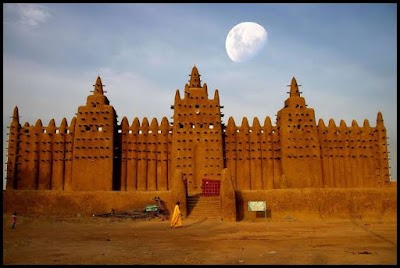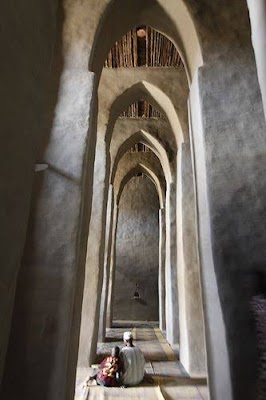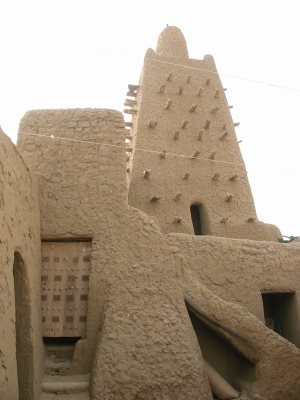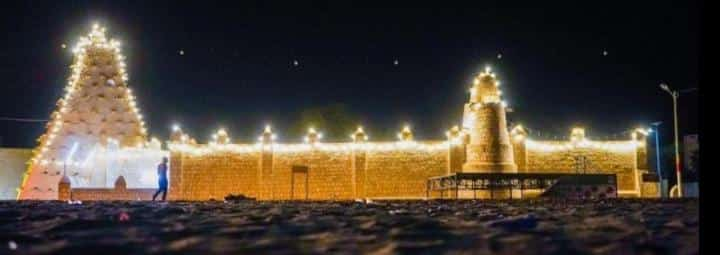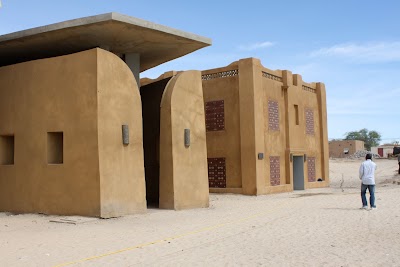Djenné Mosque (مسجد جيني)
Overview
The **Djenné Mosque**, also known as the **Great Mosque of Djenné**, is one of Mali's most iconic landmarks and serves as a centerpiece in the vibrant city of Djenné, located in the southern portion of the Tombouctou Region. This magnificent structure stands as a beacon of Islamic culture and a stunning example of Sahelian architecture, attracting visitors from all corners of the globe.
The mosque's history dates back to the **13th century**, when the original structure was built by Sultan Koumboro following his conversion to Islam. The current mosque, however, was reconstructed in **1907** during the French colonial era, preserving the grandeur and stylistic elements of the original design. In recognition of its architectural significance and cultural importance, the mosque was declared a **UNESCO World Heritage Site** in 1988, serving not only as a place of worship but also as an architectural marvel and cultural hub.
One of the mosque’s most striking features is its unique construction material: **sun-baked mud bricks**, known locally as 'ferey'. These bricks are coated with a plaster made from a mixture of mud and rice husks, giving the mosque its distinctive smooth and sculptural appearance. This innovative building technique allows the structure to remain cool during the sweltering heat of the day while retaining warmth during the cooler nights, making it both functional and aesthetically pleasing.
Dominating the skyline, the mosque is adorned with three towering minarets, each topped with **ostrich eggs** that symbolize fertility and purity. The intricate façade features rows of wooden stakes called 'torons', which serve both aesthetic and practical purposes. These torons provide permanent scaffolding for annual maintenance, necessary due to rain erosion. The community comes together for the **annual replastering event**, a vital tradition that transforms into a festive occasion, fostering a spirit of unity and collaboration among the townspeople.
Inside the mosque, the expansive **prayer hall** can accommodate up to 3,000 worshippers. The hall features a forest of rhythmic pillars supporting the roof, creating an atmosphere that is both grand and serene. The interior design emphasizes simplicity and elegance, with fine carvings and minimal decoration that reflect the mosque's primary purpose as a sacred space for reflection and prayer.
Beyond its architectural brilliance, the Djenné Mosque is a thriving center for **Islamic learning and cultural exchange**. For centuries, Djenné has served as a major trading hub and intellectual center along the trans-Saharan trade routes. The mosque has thus become a beacon for scholars and traders, significantly contributing to the spread of Islamic knowledge and culture throughout West Africa.
Visiting the Djenné Mosque offers not only a remarkable visual experience but also a deep dive into the rich history and vibrant culture of Mali. Tourists often find themselves captivated by the sense of timelessness and the spiritual aura that envelops the site. Although non-Muslims are not permitted to enter the mosque itself, the exterior view is immensely rewarding, and the surrounding town, with its labyrinthine streets and traditional mud-brick houses, is equally fascinating.
Each year, the town hosts the **'Crépissage de la Grande Mosquée'**, or the 'Plastering of the Great Mosque', a unique local festival that involves the entire community. This event brings people together to apply fresh layers of mud to the mosque's surfaces, crucial for its preservation. The festival is not only essential for maintaining the structure but also serves as a vibrant cultural celebration with music, dance, and a spirit of collaboration. For tourists, witnessing this event offers an unparalleled insight into the communal life and traditions of Djenné.
In conclusion, the Djenné Mosque is much more than an architectural masterpiece; it stands as the vital heart of a historic town, a symbol of cultural identity, and a living monument to the rich heritage of Mali. Whether you are an architecture enthusiast, a history buff, or a traveler seeking to experience the profound beauty of human creativity and community, a visit to the Djenné Mosque promises to be an unforgettable journey.


